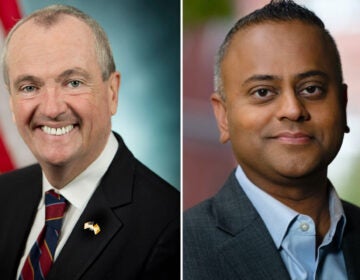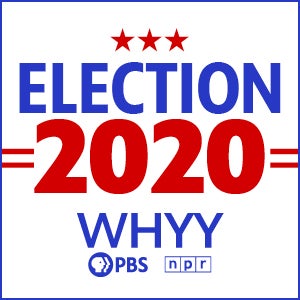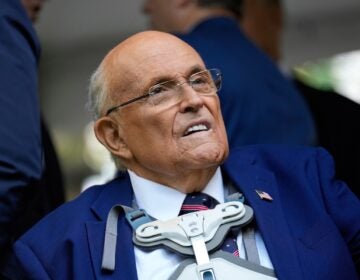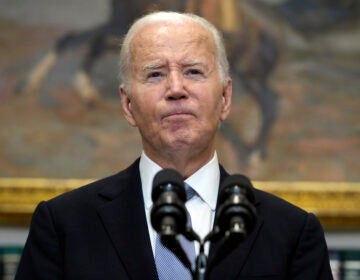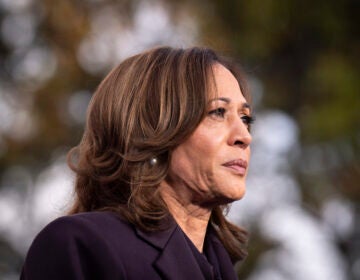As Kamala Harris takes debate stage, South Asian voters are flexing political muscle
Some South Asian voters are growing more engaged because U.S. Sen. Kamala Harris is the VP nominee. But the population is politically diverse.
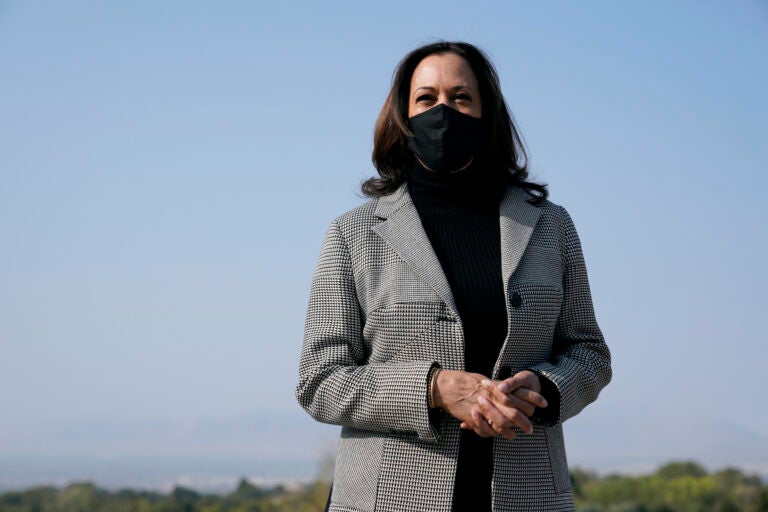
Democratic vice presidential candidate, Sen. Kamala Harris, D-Calif., speaks in Salt Lake City on Oct. 3, 2020. (AP Photo/Patrick Semansky)
Jayashree Bhaskar can pinpoint the exact moment she became truly excited about the Democratic presidential ticket.
It happened in August when California U.S. Sen. Kamala Harris accepted the party’s vice presidential nomination. In her speech, she talked about her family.
“Family is my uncles, my aunts and my chittis,” she said.
Chittis — which can also be spelled “citti” or “chitthi” in English — is a Tamil word of endearment. It was a gesture at Harris’s Indian roots — and for Bhaskar, it was revelatory.
“People just literally lit up. Oh, she said chittis!” she said. “That’s our mother tongue … A lot of Tamil folks, they were so excited that she uttered that word.”
“I even said, progress is when chittis is mainstream,” she added. “It is a huge deal.”
Bhaskar was already going to vote for Joe Biden. She and her husband K.S. Bhaskar, who live in Chester County, are politically active.
They organized for former President Barack Obama in the past, and K.S. said they’d resolved to get more involved this election cycle to oppose President Donald Trump.
But, he added, the addition of Harris — who is set to debate Vice President Mike Pence for the first time on Wednesday night — made a difference to South Asian voters like them.
The couple hears from a lot of those voters.
K.S., a software engineer, has created a program that identified South Asian voters by name from Pennsylvania’s voter rolls. He, his wife and other volunteers use it to phone bank for the group They See Blue, which aims to mobilize South Asian voters for Democratic candidates. The couple founded They See Blue’s southeastern Pennsylvania chapter.
“Not since imperial Rome has there been a society that has been so welcoming of immigrants,” he said. “Now you have Kamala Harris, who is the child of two immigrants. That is a tremendous role model for our children.”
Harris’s mother, Shyamala Gopalan, grew up in South India and met Harris’s father, who is Jamaican, while at the University of California, Berkeley.
Harris is both the first South Asian person to get a major party’s nomination and the first Black person to get a major party nomination as vice president.
Writ large, Asian American voters tend to vote for Democrats more often than Republicans. But the group is huge, diverse and far from monolithic in terms of politics.
A recent poll of Asian American voters showed that only about 28% of Indian Americans, for instance, said they would vote for Trump — though that number has grown in recent years. Vietnamese Americans, by comparison, skew more Republican than any other group. Forty-eight percent of the poll’s Vietnamese American respondents said they’d support the president — the only group in which support for Trump outweighed support for Biden.
Christine Chen, executive director of Asian and Pacific Islander American Vote, notes the group is growing in electoral power.
“For the 2020 election, 5% of the nation’s eligible voters are Asian, which equates to about 11 million,” she said. “We are also the only major racial or ethnic group in which naturalized citizens, rather than the U.S.-born, make up a majority of eligible voters.”
But as polls suggest, even if Democrats have a good shot at capturing those votes, they can’t be sure that they will.
Take Indian American voters, for instance. While Biden and Harris tend to be dominant overall, Trump has also made overtures to certain voters — particularly Hindus.
An ad from August features a picture of Trump and Indian Prime Minister Narendra Modi at a rally and played footage of the two leaders on stage, their hands joined and upraised.
Modi, whose base is comprised largely of Hindu nationalists, cultivates a strongman image that has been called similar to Trump’s.
Jay Kansara, who served as director of government relations for the Hindu American Foundation before becoming a political consultant in Washington D.C., is one of those Hindu Indian Americans who find Trump appealing.
For him, there are a bunch of reasons. He likes Trump’s relationship with Modi and supports the president’s foreign policy in India. He’s a conservative who appreciated the president’s 2017 tax cuts and likes his record of rolling back regulations.
And, he said, he doesn’t think people should assume Harris appeals to Indian voters just because of her background.
“[Harris] unfortunately has not really engaged with the Indian American community in any meaningful way, prior to her becoming a U.S. Senator,” he said. “Which gives indication that that was most probably not a huge part of her upbringing.”
Murali Balaji, a University of Pennsylvania professor who co-chairs the group Hindu Americans for Biden, has a different take.
He’s approaching this election not just as a Democrat, a Hindu or an Indian American, but as a child of immigrants. He thinks the fact that Harris shares that perspective means more than just a check on a demographic box — whatever it looks like to her in practice.
“In the case of many children of immigrants, particularly South Asian immigrants…that feeling of otherness, that feeling that you’re not wholly of one place was definitely palpable,” he said. “Kamala Harris and I are basically the second generation, the children of immigrants who are making our lives completely as Americans. That resonates to so many people.”
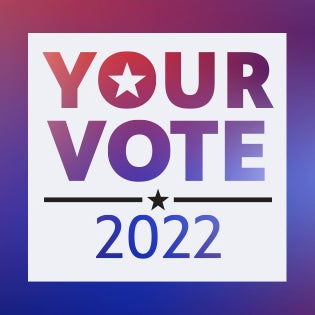
Your go-to election coverage
WHYY is your source for fact-based, in-depth journalism and information. As a nonprofit organization, we rely on financial support from readers like you. Please give today.



